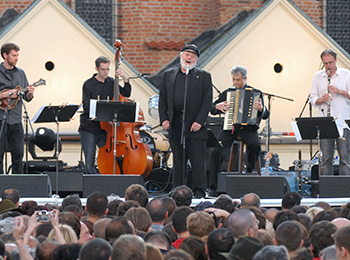On July 21, one of the most significant figures in Jewish arts and culture passed away. Theodore Bikel was a great creative spirit and superb mensch – performer, musician, activist, teacher. Known for originating the role of Captain von Trapp in the 1959 Broadway production of The Sound of Music and for starring as The Fiddler on the Roof’s Tevye over 2,000 times, Bikel was beloved for his devotion to and masterful performance of Jewish music, especially Yiddish song.
When he died at age 91, Bikel was 55 years my senior, yet in my work producing Jewish cultural events, I have repeatedly turned to his words for affirmation:
“I am a universalist. I believe in the family of man… I am curious about my neighbour. I hope he is curious about me. I sing Jewish songs. Actually, I sing in 21 languages. I sing of many cultures. But, I sing Jewish songs not because they are better songs than the songs of my neighbour. I sing them because they are mine.”
I once attended a conference in New York for Jewish cultural professionals. Bikel was the keynote speaker. He was assured and inspirational. He spoke of the imperative to create and to cultivate one’s own culture, to look to the past to pinpoint one’s place in the present and to provide direction for tomorrow, and he advocated for the kaleidoscope model of culture, not the melting pot, entreating us: “Don’t obliterate, don’t homogenize Jewish culture.”
Witnessing Bikel’s example, together with that of the impassioned professionals at that conference, I more clearly understood the energy and inventiveness in the contemporary Jewish cultural scene worldwide and made the decision to enter into it fully. I left my job at the Philadelphia Museum of Art and moved back to Canada to work in the field of Jewish arts.
Dedication to Jewish heritage and community need not be tantamount to an insular or narrow experience. Bikel’s legacy sheds light on this essential topic. Bikel was a pillar of the Jewish arts scene, but equally impactful in other circles. An ardent civil and human rights activist, he was arrested for participating in demonstrations in Birmingham, Ala., in the 1960s.
Jewish art is not limited to quaint nostalgia or stagnant regurgitations of the past, but, in its most realized fullness, mines a profuse, multi-dimensional heritage. It is rather unexpected, although most impressive, when an octogenarian appears on a hip-hop album, but such was the case with Bikel’s contributions to Montreal artist Socalled’s collaboration-centred Ghettoblaster (2007) album. The traditional Yiddish song Belz performed by Bikel is given new dimension in a modern, beat-driven remix.
Amidst a societal obsession with youth and innovation, Bikel’s artistic output reflects a cross-generational mixing that is refreshing and illuminating. This is a hallmark of Jewish culture – mi dor l’dor. Not newness for its own sake, but a dialogue across time and space for a present-day audience, breaking down a forced dichotomy between innovation and tradition.
Jewish art is not only for Jews. I often encounter a self-conscious attitude that creating and presenting Jewish art is tribalistic, only of interest to the initiated. However, anyone who works in the arts knows that the opposite is true – art is the great mediator among peoples. Neither Bikel’s audiences nor the artists he worked with were exclusively fellow Jews, and as he put it, Jewish expression is one flower amidst “a wonderful meadow with proliferating flowers.”
The key is to preserve the distinct uniqueness of that blossom. Nothing is gained by neutering Jewish expression into some generic sameness. Only through plumbing the plentiful particularity of our heritage does one arrive at universal relevance and resonance.
We are bathed in the eclectic richness that all cultures offer, yet there is something essential in embracing and developing the creative output of our people – something vital, genuine and personal.
I am immersed in Jewish culture, not because it is better than the art of my neighbour. I do it because it is mine.
